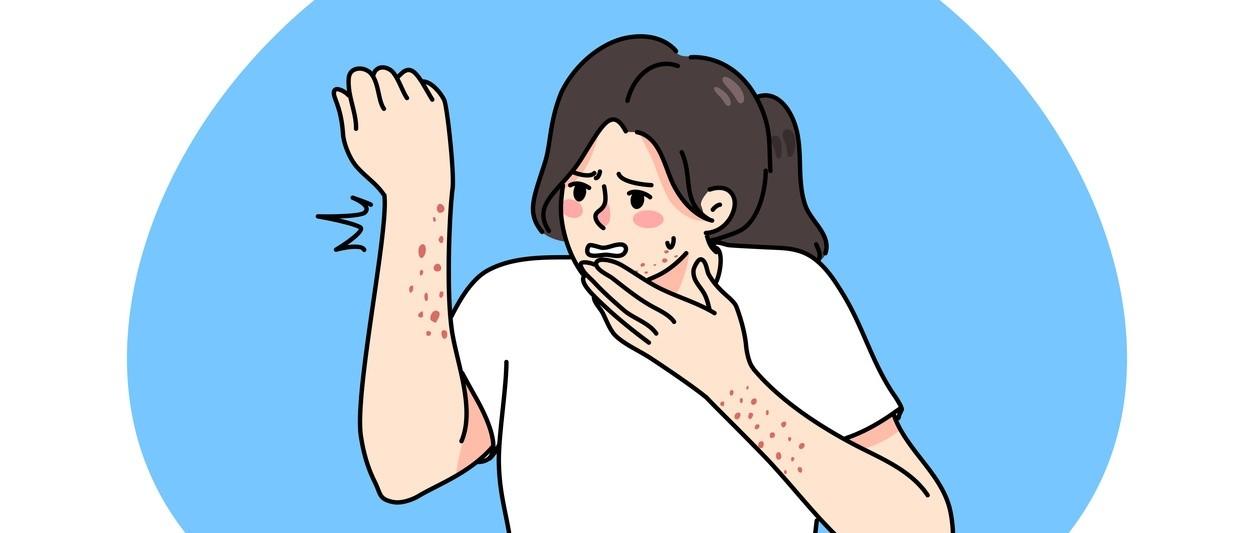
What causes our skin to break out in hives?
Peer reviewed by Dr Sarah Jarvis MBE, FRCGPLast updated by Sarah GrahamLast updated 5 Apr 2019
Meets Patient’s editorial guidelines
- DownloadDownload
- Share
- Language
- Discussion
Hives - also known as urticaria - is a relatively common itchy rash that causes red or white bumps on the skin. According to the British Association of Dermatologists (BAD), it affects around one in five people at some point in their lives, and in around half of cases the trigger is unknown. But, if you're breaking out in hives, here's what could be behind those itchy bumps.
In this article:
"Hives is caused by the release of histamine from skin cells called mast cells," explains Dr Justine Kluk of the British Association of Dermatologists.
These chemicals cause fluid to leak from tiny blood vessels just under the surface of your skin, and it's this fluid that forms those bumpy weals on the skin. Meanwhile, histamine chemicals also cause your blood vessels to widen, or dilate, which makes those red or white bumps flare up.
"It typically causes itchy pink or white raised areas of skin, which can look like nettle rash. These areas, known as weals, can appear anywhere on the body and may move from one site on the skin to another over a 24-hour period," Kluk says.
So what triggers the release of histamines? Known triggers include physical stimuli, coming into contact with an allergen, skin contact with certain substances, and viral infections like a cold or flu. However, Kluk explains: "In people with the most common type of hives - spontaneous hives - a trigger is not normally identified."
Continue reading below
Physical triggers
Possible physical triggers include heat, cold, sweat, physical pressure, or tight clothes, as well as specific foods and alcohol. Food allergies, reactions to bites or stings, and allergies to certain medications can also all act as triggers for hives, while some people develop the rash after coming into direct skin contact with certain cosmetics, perfumes, plants, latex, or chemicals.
If you're suffering from hives, Kluk also recommends avoiding the medicines codeine, aspirin, ibuprofen and naproxen, which, she says "can increase the release of histamine from mast cells, thus acting as a driver for the hives".
Stress has also been shown to lower the threshold for many skin conditions to flare up, although Kluk says she wouldn't expect it to be the only reason for hives appearing.
Chronic hives
Back to contentsIn chronic cases, where the rash is persistent, Kluk says: "You may have an underlying medical condition that is driving the process, and this would typically be investigated through blood testing."
This type of urticaria, she adds, may also be triggered by factors in the blood, such as antibodies which work against the mast cells.
"If this is suspected, a dermatologist or allergist will include this in their panel of blood tests."
Chronic hives is uncommon, however, and is defined as hives lasting for more than six weeks. Acute (short-lived) hives develops suddenly and typically only lasts 24-48 hours. In some cases, the rash may only last a few hours, but any episode of hives lasting less than six weeks is considered 'acute', even if you suffer from recurring flare-ups.
Continue reading below
Treating hives
Back to contentsWhen it comes to tackling hives, Kluk says: "Treatments can be used to suppress the symptoms, rather than curing the condition. The most common treatment is antihistamine tablets, which block the effect of histamine and reduce the itch and rash."
If you experience recurring hives regularly, she explains, your doctor will likely recommend that you take an antihistamine daily to keep the symptoms at bay.
"Other treatment options for hives may include oral steroids," Kluk adds. "And, in people with severe chronic spontaneous hives, a new biological treatment injection called omalizumab has been made available in specialist clinics."
Avoiding triggers
Back to contentsIf you know what tends to trigger your hives, the best course of action is obviously to steer clear as much as possible. However, as Kluk points out: "Triggers vary between patients, so there are no set rules for how to avoid triggering hives."
Keeping a symptom diary or going for an allergy test can be useful for working out if there's a specific trigger - for example, if you're more likely to develop hives after eating a certain food or coming into contact with a particular substance. You can then try avoiding or cutting these out to see if it helps stave off the rash.
Patient picks for Skin rashes

Skin, nail and hair health
Rise in scabies cases across the UK
The number of people with scabies is around double the expected amount for this time of year. We explain what scabies is, how to spot it, and what to do about it.
by Amberley Davis

Skin, nail and hair health
What to do when your child has a rash
As a parent, it's hard not to panic when your child develops a rash. But these disturbing skin flare-ups are often nothing to worry about. Follow our troubleshooting guide to see what to do about your child's rash.
by Gillian Harvey
Continue reading below
Article history
The information on this page is peer reviewed by qualified clinicians.
5 Apr 2019 | Latest version

Ask, share, connect.
Browse discussions, ask questions, and share experiences across hundreds of health topics.

Feeling unwell?
Assess your symptoms online for free
Sign up to the Patient newsletter
Your weekly dose of clear, trustworthy health advice - written to help you feel informed, confident and in control.
By subscribing you accept our Privacy Policy. You can unsubscribe at any time. We never sell your data.